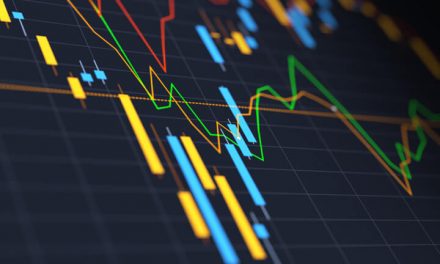DUBLIN – The global blockchain supply chain market reached a value of US$ 355.47 Million in 2021. Looking forward, the publisher expects the market to reach a value of US$ 4,874.24 Million by 2027, exhibiting a CAGR of 54.71% during 2021-2027.
Keeping in mind the uncertainties of COVID-19, we are continuously tracking and evaluating the direct as well as the indirect influence of the pandemic on different end-use industries. These insights are included in the report as a major market contributor.
Blockchain refers to a shared peer-to-peer technology that synchronizes transaction data across networks and provides a digital database for validated and immutable transactions. Using smart contracts that get automatically triggered when pre-defined business conditions are met, it effectively automates supply chain transactions, thereby removing middlemen and promoting a direct connection between stakeholders.
Blockchain supply chain also acts as an open ledger, with every transaction on the network made available in a read-only format for all the involved participants to accurately retrace to its point of origin. Therefore, it ensures optimum transparency at every level of the supply chain management, minimizes the issues encountered during goods transportation and decreases the need for information sharing via mail or any other communication platforms.
The global market is primarily driven by the extensive adoption of blockchain technology in retail supply chain management (SCM). This can be attributed to the growing online transactions, along with the rising demand for security and transparency in supply chain transactions.
In line with this, the increasing utilization of advanced technologies, such as artificial intelligence (AI) and machine learning (ML), in business strategies is leading to a higher product uptake across SMEs.
The rapid business automation is further propelling the demand for effective tracking of authentication process information, procurement data, and certifications, which, in turn, is providing an impetus to the market. In addition to this, the widespread adoption of smart devices among the masses, coupled with a considerable rise in internet subscribers, is resulting in the widespread usage of these devices for product procurement, therefore creating a positive outlook for the market.
Some of the other factors contributing to the market growth include the flourishing e-commerce sector, the augmenting demand for eliminating middlemen in the supply chain, and extensive research and development (R&D) activities conducted by key players.
Competitive Landscape:
The competitive landscape of the industry has also been examined along with the profiles of the key players being Accenture plc, Amazon Web Services Inc. (Amazon.com Inc.), Auxesis Group, Guardtime, Huawei Technologies Co. Ltd., International Business Machines Corporation, Microsoft Corporation, OpenXcell, Oracle Corporation, PixelPlex, SAP SE and TIBCO Software Inc.
Key Questions Answered in This Report:
- How has the global blockchain supply chain market performed so far and how will it perform in the coming years?
- What has been the impact of COVID-19 on the global blockchain supply chain market?
- What are the key regional markets?
- What is the breakup of the market based on the component?
- What is the breakup of the market based on the application?
- What is the breakup of the market based on the industry vertical?
- What are the various stages in the value chain of the industry?
- What are the key driving factors and challenges in the industry?
- What is the structure of the global blockchain supply chain market and who are the key players?
- What is the degree of competition in the industry?
Key Topics Covered:
1 Preface
2 Scope and Methodology
3 Executive Summary
4 Introduction
4.1 Overview
4.2 Key Industry Trends
5 Global Blockchain Supply Chain Market
5.1 Market Overview
5.2 Market Performance
5.3 Impact of COVID-19
5.4 Market Forecast
6 Market Breakup by Component
6.1 Platform
6.1.1 Market Trends
6.1.2 Market Forecast
6.2 Services
6.2.1 Market Trends
6.2.2 Market Forecast
7 Market Breakup by Application
7.1 Smart Contracts
7.1.1 Market Trends
7.1.2 Market Forecast
7.2 Payment and Settlement
7.2.1 Market Trends
7.2.2 Market Forecast
7.3 Product Traceability
7.3.1 Market Trends
7.3.2 Market Forecast
7.4 Inventory Monitoring
7.4.1 Market Trends
7.4.2 Market Forecast
7.5 Compliance Management
7.5.1 Market Trends
7.5.2 Market Forecast
7.6 Others
7.6.1 Market Trends
7.6.2 Market Forecast
8 Market Breakup by Industry Vertical
8.1 Retail
8.1.1 Market Trends
8.1.2 Market Forecast
8.2 Manufacturing
8.2.1 Market Trends
8.2.2 Market Forecast
8.3 Food and Beverages
8.3.1 Market Trends
8.3.2 Market Forecast
8.4 Healthcare
8.4.1 Market Trends
8.4.2 Market Forecast
8.5 Oil and Gas
8.5.1 Market Trends
8.5.2 Market Forecast
8.6 Others
8.6.1 Market Trends
8.6.2 Market Forecast
9 Market Breakup by Region
10 SWOT Analysis
11 Value Chain Analysis
12 Porters Five Forces Analysis
13 Price Analysis
14 Competitive Landscape
14.1 Market Structure
14.2 Key Players
14.3 Profiles of Key Players
14.3.1 Accenture plc
14.3.1.1 Company Overview
14.3.1.2 Product Portfolio
14.3.1.3 SWOT Analysis
14.3.2 Amazon Web Services Inc. (Amazon.com Inc.)
14.3.2.1 Company Overview
14.3.2.2 Product Portfolio
14.3.2.3 SWOT Analysis
14.3.3 Auxesis Group
14.3.3.1 Company Overview
14.3.3.2 Product Portfolio
14.3.3.3 SWOT Analysis
14.3.4 Guardtime
14.3.4.1 Company Overview
14.3.4.2 Product Portfolio
14.3.4.3 SWOT Analysis
14.3.5 Huawei Technologies Co. Ltd.
14.3.5.1 Company Overview
14.3.5.2 Product Portfolio
14.3.5.3 SWOT Analysis
14.3.6 International Business Machines Corporation
14.3.6.1 Company Overview
14.3.6.2 Product Portfolio
14.3.6.3 SWOT Analysis
14.3.7 Microsoft Corporation
14.3.7.1 Company Overview
14.3.7.2 Product Portfolio
14.3.7.3 SWOT Analysis
14.3.8 OpenXcell
14.3.8.1 Company Overview
14.3.8.2 Product Portfolio
14.3.8.3 SWOT Analysis
14.3.9 Oracle Corporation
14.3.9.1 Company Overview
14.3.9.2 Product Portfolio
14.3.9.3 SWOT Analysis
14.3.10 PixelPlex
14.3.10.1 Company Overview
14.3.10.2 Product Portfolio
14.3.10.3 SWOT Analysis
14.3.11 SAP SE
14.3.11.1 Company Overview
14.3.11.2 Product Portfolio
14.3.11.3 SWOT Analysis
14.3.12 TIBCO Software Inc.
14.3.12.1 Company Overview
14.3.12.2 Product Portfolio
14.3.12.3 SWOT Analysis
Source: Research and Markets





